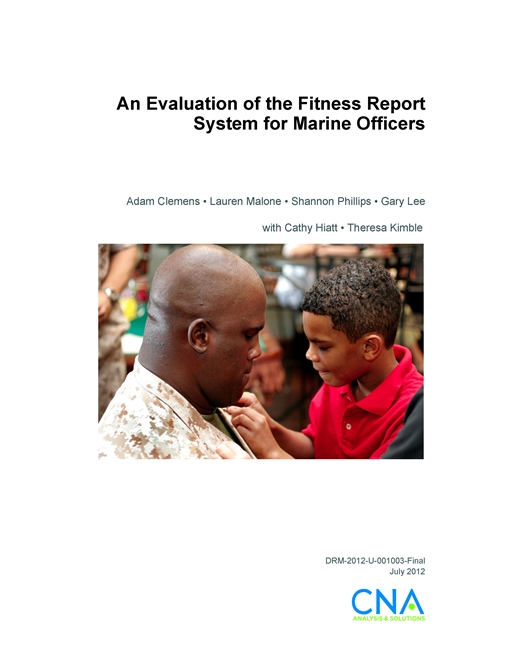The Marine Corps Fitness Report (FitRep) system is the main determinant of an officer’s career designation, promotion, and opportunities for command and resident schooling. The current process was implemented in 1999 to address the previous system’s perceived shortcomings—chiefly mark inflation. The Director, Manpower Management Division (MM), asked CNA to review whether the system is accomplishing what the Corps intended. She requested that we focus on officers and consider whether the new system is keeping inflation in check, ensuring fairness for all officers, and helping the various boards select the “best and most qualified” officers.
The FitRep form contains administrative data, descriptions of duties/ accomplishments in the present billet, 14 dimensions of performance evaluated by the reporting senior (RS), an overall assessment by the reviewing officer (RO), and subjective comments from both the RS and RO. A FitRep average (FRA) of the 14 scores is converted into a relative value (RV) that describes that Marine’s position relative to other reports written by the RS on officers in the same paygrade.
In this study, we examined data from all officer FitReps (January 1999 to August 2011), matched with personnel records for Marine Corps officers. We reviewed the FitRep training curriculum and interviewed representatives throughout MM, general officers who have served on promotion and command boards, instructors at The Basic School (TBS) who teach new lieutenants about FitReps, and captains and majors studying at the Expeditionary Warfare School and Command and Staff College, respectively. To the extent possible, we compared insights from these stakeholders with statistical analyses of the data.
Room for improvement in implementation of FitRep system
Overall, we find that the FitRep system is working well. There is no evidence of rampant inflation at an aggregate level. The inclusion of both RS and RO assessments appears to be helpful and informative. We find that FitRep marks are consistent with other officer quality indicators, and subject matter experts agree that the system usually results in promoting the best and most qualified officers. We do, however, find evidence that there is some room for improvement.
Training for RSs and ROs
To our knowledge, the only formal training officers receive about FitReps is at TBS, before they have any experience with the system. Because TBS students will not immediately act as ROs, they receive no training on RO responsibilities. Training also does not explain how the RV is generated, and gives the false impression that the RV automatically normalizes FRAs into a “bell curve” distribution.
RSs and ROs do not always act in a way that is strictly consistent with the original intent of the Performance Evaluation System (PES) manual. This may be partly because of the lack of formal training. One example is that RSs tend to award “room to grow” marks the first time they evaluate an officer and then award higher FRAs as they continue to evaluate him or her. This is consistent with training they receive at TBS that their FRAs for a particular Marine “should” grow over time, and it could be interpreted as instruction not to consider each report- ing period separately from all others.
RO marks are intended to have a distribution referred to as the “Christmas tree,” with few marks at the top in order to help boards identify exceptionally qualified Marines. They are also intended to be a relative assessment within a paygrade. However, the actual distribution of RO marks is dramatically different, and officers in higher grades receive higher RO marks on average. We are aware of no formal training on RO responsibilities.
Boards consider subjective comments as well as numerical marks, and their processes for weighing comments are not common knowledge. RSs and ROs feel that greater transparency about what boards are looking for, and how much weight they assign to specific phrases, would improve fairness.
Download reportApproved for Public Release; Distribution Unlimited. Specific authority: N00014-11-D-0323
Details
- Pages: 102
- Document Number: DRM-2012-U-001003-Final
- Publication Date: 7/1/2012
